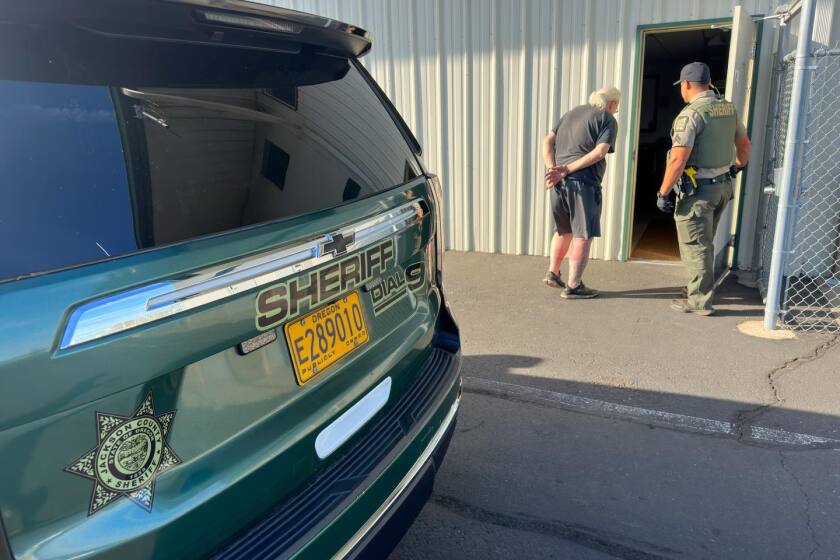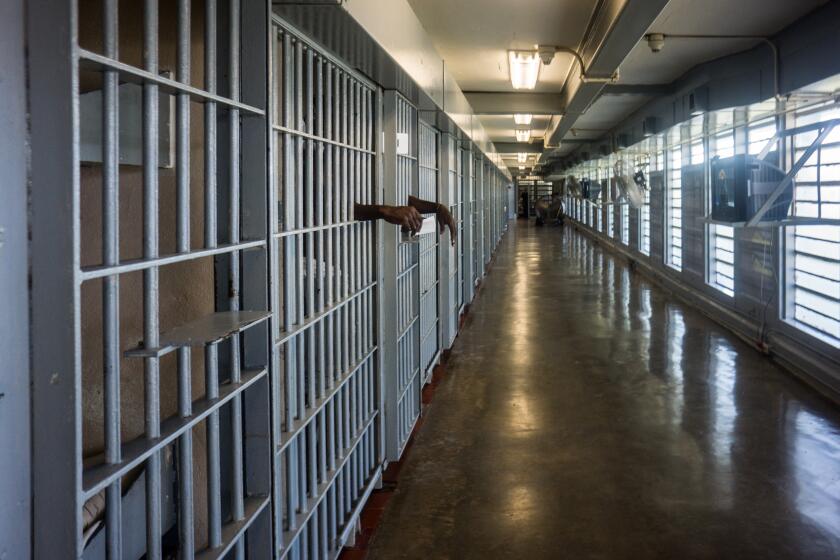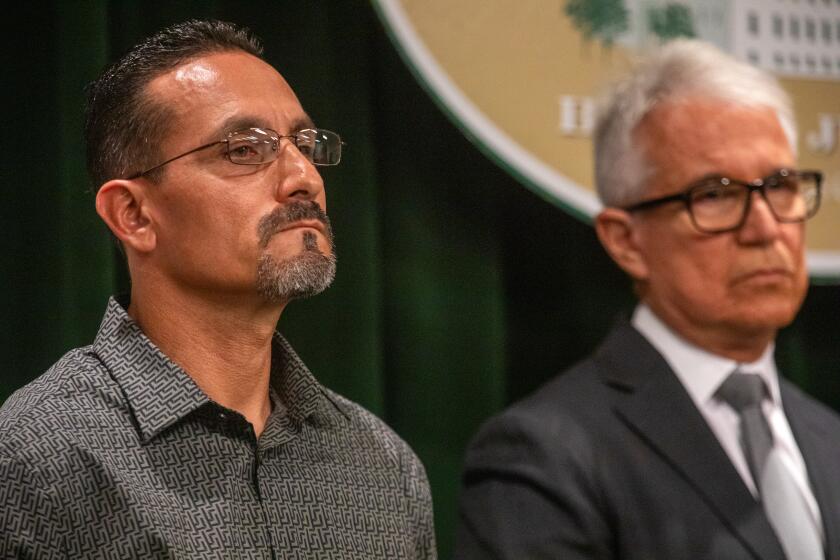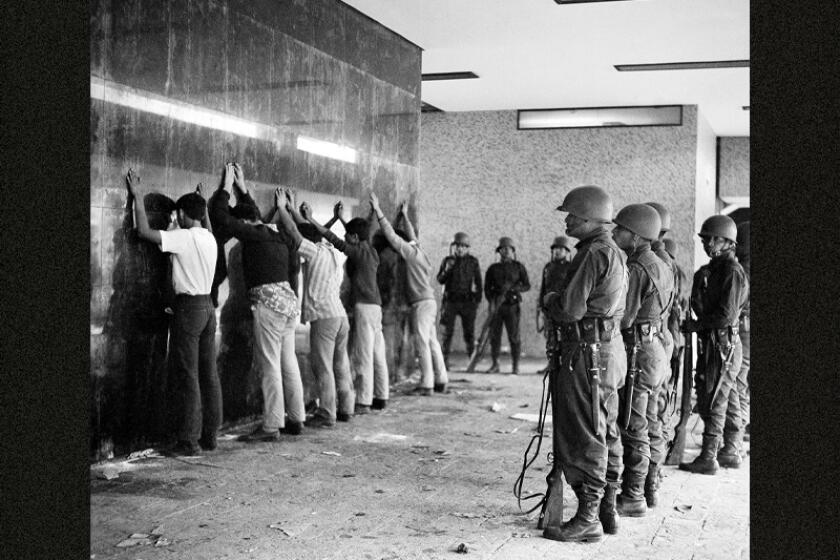A married couple listening to a true-crime podcast led to a man’s exoneration in the murder of a priest
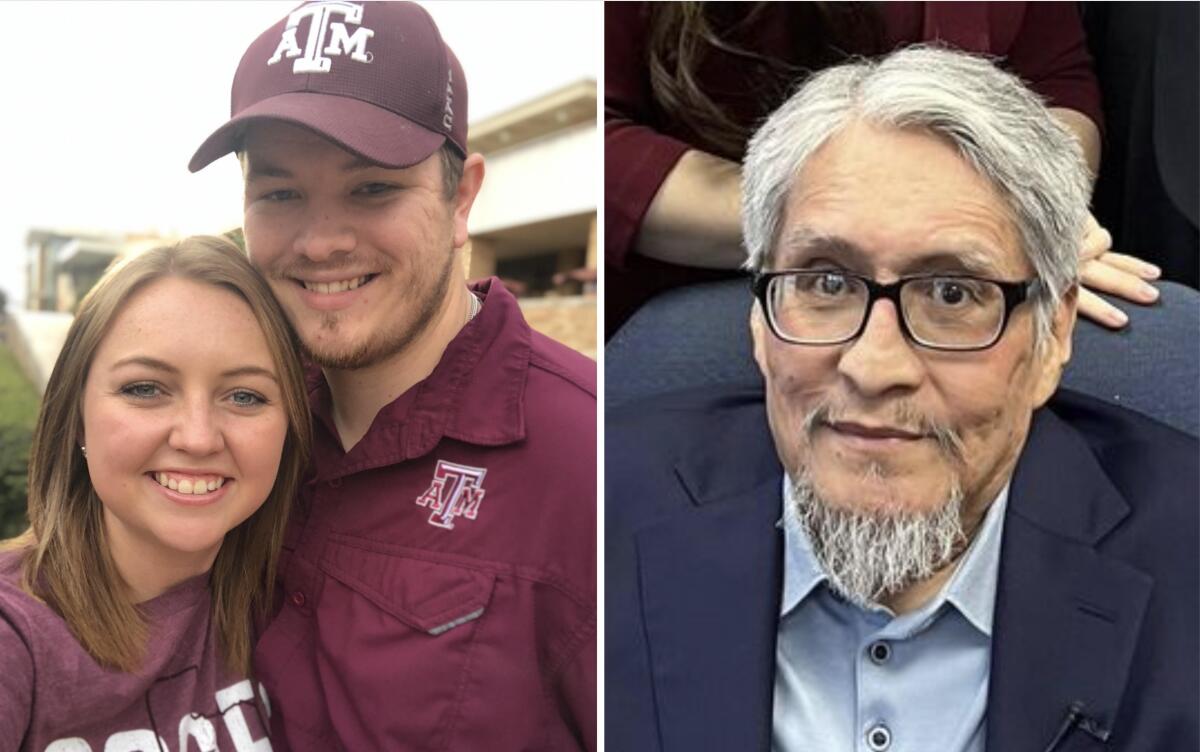
- Share via
The stars aligned when a young married couple hooked on a true-crime podcast stumbled upon the curious case of a murdered Catholic priest and the seemingly innocent Apache hitchhiker who had been imprisoned for the crime. The couple happened to be uniquely positioned to kick-start his exoneration.
Harlee and Michael Gerke are high school sweethearts from Odessa, Texas, who moved to the Bryan-College Station metro area, about seven hours from their hometown. They made frequent trips back home to visit family and filled their lengthy drives with episodes of “Crime Junkie,” a popular true-crime podcast that averages roughly 50 million downloads a month.
It was 2021 and the Gerkes were well into one of their drives back to their hometown when they heard “Crime Junkie” hosts Ashley Flowers and Brit Prawat break down the perplexing case of Father Patrick Ryan.
“We were about an hour away from Odessa and we started listening to this case and it really caught our attention, us being from Odessa, and it being such a crazy case,” Harlee Gerke, 25, told The Times by phone on Monday. “We heard it and we were like, ‘Man, there’s no way he could have done this.’
“We definitely thought it should be looked into more,” she continued. “And it just so happens that Michael’s dad is the chief of police in Odessa, and we were going to see him in about an hour.”
After Shawn Melton came forward with leads about the 1987 death of Jeremy Stoner, police were convinced he was the killer, even after two hung juries. Now, another suspect has been arrested.
The podcast recounts the murder story like this: Ryan was an Irish Catholic priest who was found savagely beaten to death in a seedy Odessa motel room days before Christmas in 1981. His arms were bound behind his back and he was gagged. The murder weapon was the leg broken off a table, and he had been sexually assaulted. The room at the Sage and Sand Motel, as it was known at the time, was trashed. Furniture was destroyed, drywall was smashed and beer bottles and cigarette butts were strewn about.
The crime scene was practically swimming with DNA evidence — but it was 1981, and forensics weren’t what they are today.
Ryan had checked into the motel using an alias and a fake address. His case from the get-go was sketchy. Dinner was still on the stove at his home and a family photo album was sitting on his kitchen table, but the album didn’t belong to the priest. It belonged to an Apache hitchhiker named James Harry Reyos. The only items missing were the priest’s accordion and chalice.
Reyos was the police department’s only lead, and when officers questioned the man — who stood only 5½ feet tall and weighed around 125 pounds, compared to Ryan’s 200 pounds — he told officers he had met Ryan when the priest picked him up on the side of the road earlier in the month.
The two became friendly. Ryan invited Reyos, who was raised on the Jicarilla Apache Nation reservation in New Mexico, to his home for dinner and drinks. He asked Reyos to bring a family photo album, which Reyos did on Dec. 20, 1981.
That night, as the hour grew later and several beers with Ryan turned into several screwdrivers, the priest lunged at him and forced him to perform oral sex, Reyos told police.
Reyos had struggled with alcoholism, which he has said was a symptom of his confusion and shame surrounding his own deeply closeted homosexuality; he had already had several alcohol-related run-ins with police in the area and regularly spent a few nights in jail for public intoxication. When Ryan sexually abused him that night, Reyos said, he panicked and bolted from Ryan’s home, leaving the photo album behind.
But the next day, Reyos was desperate for a ride to his car in Hobbs, N.M., where a bail bondsman was holding it as collateral. It was roughly 45 minutes from the area where both Ryan and Reyos lived — and the only person Reyos could turn to was the priest.
The U.S. Supreme Court in 2020 ruled that non-unanimous juries are unconstitutional. Yet in Louisiana, people convicted by split juries prior to 2019 remain incarcerated without a form of relief.
According to Reyos, Ryan picked up another hitchhiker on their drive to Hobbs and then dropped the 25-year-old Reyos off to retrieve his car. Later that night, Ryan was murdered in the Odessa motel room. Reyos provided investigators with a paper trail, including several gas station receipts and a speeding ticket he had received on the night of the killing, which proved he was 215 miles away in Roswell, N.M., when the priest was murdered. None of the bloody fingerprints matched Reyos’ prints. He even acquiesced to a polygraph test, which he passed.
The case went cold.
But Reyos, who spoke with Texas Monthly’s Michael Hall for an article published in March, said he was racked with guilt for being one of the last people to see Ryan alive. He had convinced himself that his request for a ride had contributed to the priest’s murder. He called the police nearly a year after Ryan’s death and drunkenly confessed to a murder he later insisted he did not commit. “It just kept eating at me, eating at me, eating at me. I should have just hitchhiked to Hobbs. I’d done it before,” he told Texas Monthly.
He recanted his confession almost immediately, but it was too late. Despite there being no physical evidence that tied Reyos to the murder — and even with the speeding-ticket alibi that placed him far from the scene of the crime — Reyos was convicted in 1983 and sentenced to 38 years in prison. He eventually was granted parole and freed in 1995 but was imprisoned twice more: once for a DUI and once for allegedly flashing a woman, which according to Texas Monthly he didn’t do. The woman told police that Reyos was not the guy, but with a smeared rap sheet, he was arrested anyway.
In total, Reyos was imprisoned for 24 years.

Harlee and Michael Gerke were riveted as they listened to the “Crime Junkie” podcast’s retelling of the events that ultimately turned Reyos’ life upside down. But more than being merely fascinated by the crime, they were compelled to do something. The couple was only an hour away from Michael Gerke’s parents’ house in Odessa, so when they arrived, they brought the case to Michael’s dad, Odessa’s chief of police, who shares his son’s first name.
“As soon as they told me about the case, I’m like, ‘Surely that can’t be true,’” the elder Michael Gerke told The Times over the phone on Monday. The police chief asked his colleague Capt. John Sykes, who runs the department’s Criminal Investigation Division, to pull the entire original case file. Then he read through it. “When I got to the end, it felt like I should be like halfway through, because there just wasn’t enough there to support a conviction.”
Most of the evidence from Ryan’s case was thought to have been destroyed, due to the department’s record-keeping policy, but Sgt. Scotty Smith was able to dig up copies of the fingerprint templates, per Texas Monthly. A crime-scene tech, Stacy Cannady, located the original cards and ran the fingerprints through the nationwide Automated Fingerprint Identification System, a database that was implemented in 1999, more than 15 years after Reyos was convicted. The bloody fingerprints matched three men who had already died.
Gerardo Cabanillas was promised probation if he confessed to a sexual assault he didn’t commit when he was 18 years old. After 28 years in prison, Cabanillas has been freed after DNA evidence proved his innocence, officials announced Monday.
“It became pretty clear that wow — there was absolutely no physical evidence to show that Mr. Reyos was in that motel room where the murder happened,” the chief continued. “There’s really no physical evidence to show that he was even in Odessa when it happened.”
The police chief said that anyone he showed the evidence to was amazed that this could happen. “I think we all know why,” he told The Times. “I think in the 1980s in small-town West Texas, you take a Native American who happens to be gay and he was probably considered a throwaway person.”
The elder Gerke contacted Texas’ Ector County District Attorney’s office, which then contacted the Innocence Project of Texas, a nonprofit that has helped exonerate 30 wrongfully convicted Texans. The organization told The Times that it had actually dug into Reyos’ case several years earlier, but because all evidence from the case was thought to be destroyed, it had no legal pathway forward at that time.
On March 24, 2023, Reyos was granted an evidentiary hearing to determine whether he should be found legally innocent. Two lawyers with the Innocence Project of Texas accompanied Reyos in the courtroom, and the police chief took the stand.
“Well, testifying in the trial, I mean, those are easy things,” Chief Gerke said. “Who could sleep at night, knowing what we knew, after we read that case, and we did the investigation, if we didn’t move forward and try to get him exonerated? And seeing Mr. Reyos in court — heartbreaking. I thought, ‘What if this happened to one of my children? What if one of my children lost that many years of their life for something they didn’t do?’ So maybe we’ve given him back just a small part of his life.”
On Oct. 4, Reyos was declared innocent by the Texas Court of Criminal Appeals. The state will compensate Reyos $80,000 for each year that he was wrongfully incarcerated, which the Innocence Project of Texas said will apply to all 24 years, because he would not have been on parole without the erroneous murder conviction.
Fifty-five years ago, Mexico’s authoritarian government killed students during a peaceful demonstration. It would later become known as the Tlatelolco massacre.
The younger Michael Gerke, 27, told The Times that his father called him the morning that Reyos was officially exonerated to share the exciting news.
At the end of “Crime Junkie” podcast episodes, the hosts issue a call to action for listeners who may have information that could alter the course of an investigation. “You never think that you’re going to be able to do anything,” the younger Gerke told The Times. “Honestly still, I don’t feel like we did much, but I guess there is that missing link that if we hadn’t listened to it, then my dad would have probably never listened to it. It was just a weird perfect storm.”
“Crime Junkie” host Flowers told The Times that the podcast’s role in Reyos’ exoneration is what they hope will happen with many of the cases that they cover: “that someone out there is listening who can enact change.”
“We have such a big audience at this point that you just never know who the episode is going to find or touch. I think that our episodes have a lot of impact in less direct ways,” she said. “We’ve gotten so many emails from people, just hearing these stories have prevented other tragedies from happening, or other miscarriages of justice from happening. But this was the first time where it was such a direct correlation between what happened and the fact that we had aired the episode, so that’s amazing to see.”
After hearing the court’s decision, Reyos said in a statement from the nonprofit that had jumped to his defense, “I am so grateful to Innocence Project of Texas for this day. I want this to serve as hope to the people of Texas that justice can prevail.”
He added, tearfully, “My father told me to never give up, and I never did.”
Reyos’ father attended every day of his son’s 1983 trial. He died a year after his son was convicted, while Reyos was imprisoned for a killing he didn’t commit.
More to Read
The biggest entertainment stories
Get our big stories about Hollywood, film, television, music, arts, culture and more right in your inbox as soon as they publish.
You may occasionally receive promotional content from the Los Angeles Times.
